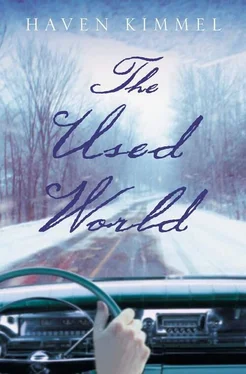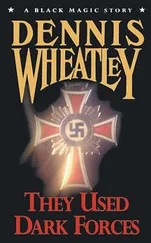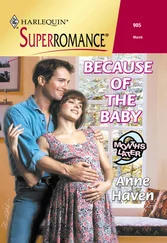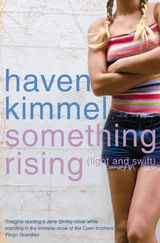What if the Rhine were freezing? What if her mother did not live? What if there were no difference between the surface of a German fighter jet and Hazel’s mind? It was that question that startled her awake, and even after she opened her eyes she didn’t understand what she was seeing, because outside her window, in the light of the dipping moon, a plane was gliding silent between two trees. Hazel held her breath, waited for a flash of light more awful for its lack of sound, the vacuum they prepared for during drills at school. Nothing came. The plane disappeared, passed once again, finally lowered its landing gear, and, wings tilted up, it alighted in her window.
The owl was backlit, enormous. Hazel knew she should not be able to see his eyes, but saw them. The stare of the bird felt colder than the air outside. He did not speak or move, and the way he didn’t move was so deliberate Hazel couldn’t move either, as if she had become one of the toys at the tea table. Her hands lay useless at her sides, and her shallow breaths didn’t lift her coverlet. The owl held her gaze so long Hazel feared she might yet return to dreaming, until, without warning, he was off the window ledge, sailing in one revolution around her room, counter to the circus train and the impotent, fading animals, and back out the window. There had never been the slightest sound.
Hazel broke free of the trance, scrambling out of bed and grabbing her brown leather play shoes, which she slipped on her bare feet. Her thick white robe was hanging on the back of her door; she tied it with an unsteady haste. She had to stop and catch her breath before she stepped out into the hallway. You weigh nothing, she told herself, closing her eyes and picturing herself levitating past the door to her parents’ bedroom. You weigh nothing. The brass doorknob felt resistant in her hand, but turned with the polished ease that came with a full-time handyman.
She stepped out into the hallway and closed the door behind her with a slight tick. Two wall lamps were always kept lit, one on each end, and Hazel stood still a moment, as her vision adjusted to the pale yellow light. The pattern of the Oriental was, she saw now, a thousand eyes. If she moved to the left they opened. If she moved to the right they closed.
The floorboards closest to the walls were least likely to complain. Hazel slid along the mahogany paneling, the fabric of her robe whispering. At the top of the formal staircase she looked down into the thick darkness of the parlor, unsure of what she was about to do. What if you let the owl decide? She straddled the banister, a game she had never imagined would have a useful purpose, and slid noiselessly down to the thick newel post, which stopped her like a pommel on a cowboy’s saddle.
Her hand grazed the red settee embroidered with gold peacocks, the floor lamp with the milk-glass shade. She was afraid to go out the front door for all the locks, so she slipped around the heavy columns and into the library, where she could make her way to the service door. Here there was just a simple deadbolt, and on the outside screen a hook and eye. The doors closed behind her with such grace she wondered if she had opened them at all.
She made no noise crossing the porch, even though her leather brogans were awkward and half a size too big, as her mother tended to buy things ahead of the season they were in. Down the steps, the metal rail burned her hand. Jefferson Leander, who built the house, realized after moving in that he was too close to the county road. He had the original road closed and moved fifteen acres forward. The Hunnicutts called the remnant the Old Road, and even after ninety years it was clear, and circled their sixty acres. Hazel ran down to the driveway and turned right, following the Old Road past the apple orchard, past the fire ring, the cemetery where no one had been buried since 1888. She ran past the four-story barn where her pony, Poppy, was sleeping, probably dreaming of delivering a hard bite. Hazel ran away from the house and her parents, away from the teacups and the stained glass doors in the library bookcases, the track on which those doors opened with a sound like a metronome. She ran away from the deep dining room with the red carpet and captain’s bell; away from the butler’s pantry where her parents’ wedding crystal flashed, sharp and bright as stars. She tried to forget the ball of gray fur on the barn’s unused fourth floor, fur that Hazel had found a year ago and was keeping there as evidence of some unseen but powerful crime. She ran past the farm truck abandoned since the 1930s, a bullet hole in the windshield and a small tree sprouting through the floorboard—ran past it and it might as well have not been there. She ran on ruts, on rocks, on frozen shards of Kentucky bluegrass, until she reached the apex of the Old Road. From here the downward grade was steep enough to give Poppy pause when they cantered toward the first meadow. Hazel stopped because she wasn’t sure where she should go. The meadows were mown clear, the line of forest between her and the river too black to consider. She heard herself breathing, felt a fist in her chest. Afraid, she studied the forest at the bottom of the hill. Virgin timber—a wealth of sycamore and birch and oak, trees so tall they seemed more alive than Hazel herself, more real than the words in any history book or any photograph, even of Uncle Elmer. Drowned. These trees had outlived him.
Nanny had told her that if she held her hands against a birch tree in the light of the full moon, the bark would peel away on its own, would roll down the trunk like old wallpaper in steam. Hazel saw the birch then, its silver flesh a streak of frozen lightning; her eyes traveled from the roots up to the lower branches, the scars where someone the size of a giant had rested his hands and relieved the tree of its armor. She studied the tree’s dark heart, where anything could be nesting. Her eyes skated up and up until she saw, at the very top, so close to the stars he could wear them like a crown, a man in black, squatting, his legs tucked under him. She thought it was a man, a midget black as coal, the sort of creature who should have been painted on her circus train but wasn’t. He will never get down from there, she thought, and before the thought was whole, the man had stretched his legs and was leaping like a diver into a pool of winter darkness. With arms outstretched, he fell, and then with a single downward closing of his wings, he flew. Hazel didn’t move, even as she saw that where he meant to land was where she stood. She didn’t move until he was so close she could see his claws lower and engage.
The stones of the Old Road cut through Hazel’s nightgown and bloodied her knees as the bird’s claws caught her on the forehead and dragged backward into her hair. She made a rabbity sound—half newborn, half terror—and tried to cover her head with her arms. There was a split second in which she felt the downdraft of his wings like the heat of a bonfire, and then she was on her elbows and knees and everything around her was quiet. The owl was gone. Hazel stood and looked around her but there was no sign of him. She reached up and touched her forehead, her scalp. Her hand came away covered with blood, and there was blood on her nightgown and robe.
In the morning she would carry this wound to her mother, who would stitch it up tight. The gown and robe would be bleached, mended. Much of the night would be forgotten, in the way that what is unspoken is often unremembered. What would remain, barely visible under Hazel’s hair, would be the two scars, tracks left like art on the wall of a cave. That primitive, and that familiar.
Sitting beside Claudia, Rebekah continued to run the receipts, each stack twice. She ran two adding machine tapes, attaching them both to the stack with the stapler that said public hardware on the top. Nothing in this building was new—nothing was specific to it. Here groups of furniture that had lived together for fifty years were separated, sold, sometimes destroyed. The place had a powerful effect on Rebekah, even though she’d worked for Hazel for nearly five years. The fluorescent lights flickered and whined, an everyday menace. And in bad weather, like today, the metal walls of the back half of the building seemed to bow inward, growling against their joinings like a chain saw.
Читать дальше












